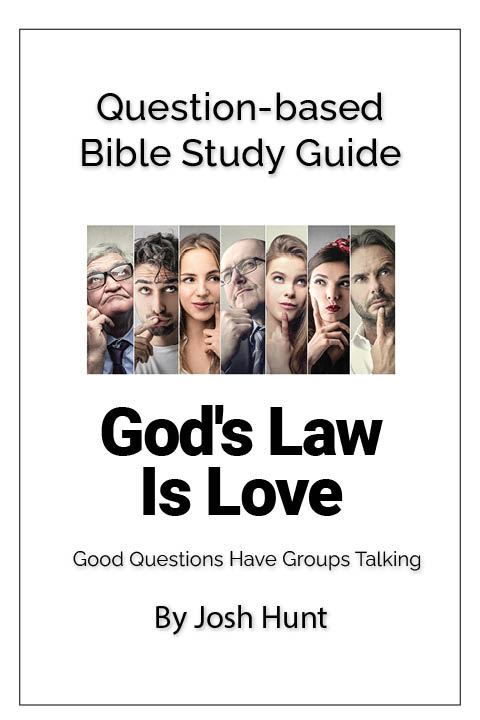God's Law Is LoveGod’s Law Is Love, Lesson #1 God’s Law Is Love, Lesson #2 God’s Law Is Love, Lesson #3 God’s Law Is Love, Lesson #4 God’s Law Is Love, Lesson #5 God’s Law Is Love, Lesson #6 God’s Law Is Love, Lesson #7 God’s Law Is Love, Lesson #8 God’s Law Is Love, Lesson #9 God’s Law Is Love, Lesson #10 God’s Law Is Love, Lesson #11 God’s Law Is Love, Lesson #12 God’s Law Is Love, Lesson #13 One point of conflict in the first-century church concerned the authority and relevancy of the Law of Moses. This quarter will explore the relationship between faith and law through Jesus’ teachings and writings to the first-century church. Jesus, the Pharisees, and the LawDuring his earthly ministry, Jesus experienced conflict with certain Pharisees. This party of Judaism was strict and passionate regarding obedience to the Law of Moses and its related commentary. To ensure obedience, they had established traditions to guide their actions. However, Jesus identified disparities between the requirements of the Law of Moses and the Pharisees’ obedience. One inconsistency involved their devotion to the law at the expense of acting with love (see Luke 11:42, lesson 1). Other inconsistencies regarded their observance of the Sabbath (see Luke 14:1–6; John 7:14–24; lessons 2 and 3). On one occasion, some Pharisees and teachers of the law brought a woman to Jesus, charging her with the crime of adultery. The leaders planned to use the opportunity to trap Jesus. However, Jesus flipped their expectations. He suggested that following the requirements of the Law of Moses for this woman—in this case, capital punishment—should be initiated by the person “without sin” (John 8:7, lesson 4). Jesus’ action was not in violation of the Law of Moses. On the contrary, he taught that keeping the law should follow God’s requirements for justice and mercy. Paul, the Church, and the LawAfter Jesus’ ascension, the composition of churches became diverse. These communities consisted of Jews raised under the Law of Moses and Gentiles not accustomed to that law. This mix created the opportunity for turmoil in the church. Certain Jewish believers insisted that all followers of Jesus—Jew or Gentile—must follow the Law of Moses. As a result, these believers emphasized that converted Gentile men should undergo circumcision. Conflict regarding circumcision and the role of the Law of Moses came to a head during the events described in Acts 15 (lesson 10). Church leaders gathered in Jerusalem to discuss the relevance of the law for Gentile believers. Did Gentiles have to adhere to the law to become part of the people of God? The apostle Peter answered, no! All people can receive salvation by faith “through the grace of our Lord Jesus” (Acts 15:11). Through faith in Jesus, a person … receives God’s Spirit. Paul taught that observing the Law of Moses was not enough for salvation. God’s people seek a circumcision of the heart, not the flesh (Romans 2:29, lesson 5). While the law is “holy” (7:12, lesson 6), it cannot bring salvation. If people could gain right standing with God through the law, Christ would have died in vain (see Galatians 2:21, lesson 7). The Law of Moses cannot bring the presence of the Spirit (see Galatians 3:2–6, 11–12, lesson 8). Through faith in Jesus, a person becomes a child of God and receives God’s Spirit (see 4:6, lesson 9). Because of the Spirit’s indwelling, believers’ lives would bear the fruit of their transformation (see 5:22–23). Paul never condoned ungodly behavior. Christian liberty is not a license for sin. Instead, a believer’s display of love to others fulfills the requirements of the law (Romans 13:10, lesson 11). Exhibiting personal freedom may cause weaker Christians to stumble (see 1 Corinthians 10:23–30, lesson 13). The people of God should use their freedom to love God and others. Krause, Mark S. 2023. “Quarter at a Glance.” In The NIV Standard Lesson Commentary, 2023–2024, edited by Jane Ann Kenney, Ronald L. Nickelson, and Taylor Z. Stamps, 30:3. The NIV Standard Lesson Commentary. Colorado Springs, CO: Standard Publishing. |
If you are wanting to do a particular passage or book study and can't find it, feel free to email me at josh@joshhunt.com21 Laws of Discipleship -- the book -- |



















